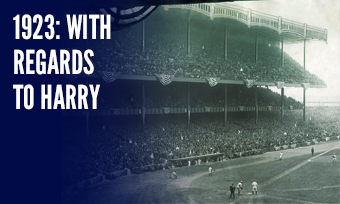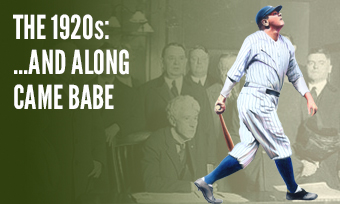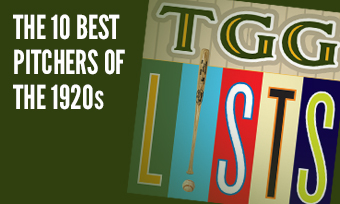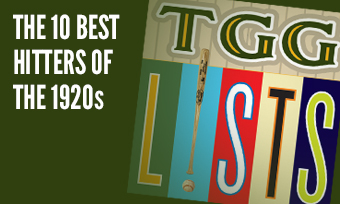The Yearly Reader
Leaders and Honors, 1923
Our list of baseball’s top 10 hitters and pitchers in both the American League and National League for the 1923 baseball season, as well as the awards and honors given to the game’s top achievers of the year.
The National League’s Top 10 Hitters, 1923
Bold type in brick red indicates league leader.
1. Jack Fournier, Brooklyn
Key Numbers: 133 games, .351 average, 91 runs, 181 hits, 30 doubles, 13 triples, 22 home runs, 102 RBIs.
A trade from St. Louis infuriated Fournier to the point that he initially refused to report to the Robins—but they were happy that he changed his mind.
2. Rogers Hornsby, St. Louis
Key Numbers: 107 games, .384 average, 89 runs, 163 hits, 32 doubles, 10 triples, 17 home runs, 83 RBIs, .459 on-base percentage, .627 slugging percentage.
Somehow, Hornsby managed to maintain his batting brilliance despite numerous knee injuries, a tabloid-soaked extramarital affair, a clubhouse scuffle with Branch Rickey and a season-ending suspension toward the end of the year.
3. Frankie Frisch, New York
Key Numbers: .348 average, 116 runs, 223 hits, 32 doubles, 12 home runs, 111 RBIs, 29 stolen bases.
The Fordham Flash found fame and fortune as his fantastic feats fueled foes with fear.
4. Max Carey, Pittsburgh
Key Numbers: .308 average, 120 runs, 188 hits, 32 doubles, 19 triples, 73 walks, 51 stolen bases.
For the second straight year, Carey stole 51 bases while being caught infrequently (eight times).
5. Pie Traynor, Pittsburgh
Key Numbers: .338 average, 108 runs, 208 hits, 19 triples, 12 home runs, 101 RBIs, 28 stolen bases.
In his second full season, the 24-year-old third baseman led the NL in triples and reached double figures in home runs for the only time in his Hall-of-Fame career.
6. Jim Bottomley, St. Louis
Key Numbers: .371 average, 194 hits, 34 doubles, 14 triples, 8 home runs, 94 RBIs.
“Sunny Jim” was the primary reason the Cardinals decided to ship Jack Fournier to Brooklyn.
7. Edd Roush, Cincinnati
Key Numbers: .351 average, 99 runs, 185 hits, 41 doubles, 18 triples, 6 home runs, 88 RBIs.
Another spring, another holdout for the veteran Reds star. He demanded $25,000; the Reds said $15,000, take it or leave it. Roush took the $15k, and went on to top .350 for the third straight season.
8. Cy Williams, Philadelphia
Key Numbers: .293 average, 98 runs, 41 home runs, 114 RBIs, 59 walks.
Williams’ prodigious year included 15 home runs in May (a monthly NL record that would hold for 30 years) and 26 within Baker Bowl’s cozy confines.
9. Ross Youngs, New York
Key Numbers: .336 average, 121 runs, 200 hits, 33 doubles, 12 triples, 87 RBIs, 73 walks.
The amiable 26-year-old outfielder continued to prove his worth to the Giants.
10. Jigger Statz, Chicago
Key Numbers: 154 games, .319 average, 655 at-bats, 110 runs, 209 hits, 33 doubles, 8 triples, 10 home runs, 70 RBIs, 29 stolen bases.
The man who would amass over 4,000 professional hits—the bulk of them still to come playing in the Pacific Coast League—had his best campaign as a major leaguer.
The American League’s Top 10 Hitters, 1923
1. Babe Ruth, New York
Key Numbers: .393 average, 151 runs, 205 hits, 45 doubles, 13 triples, 41 home runs, 130 RBIs, 170 walks, 93 strikeouts, 17 stolen bases, .545 slugging percentage, .764 slugging percentage.
A year after off-the-field disruption from the commissioner’s office and the Yankees’ brass, Ruth fully re-focused on baseball and returned to his usual Herculean self—hitting a career-high .393 to go with all the power.
2. Tris Speaker, Cleveland
Key Numbers: .380 average, 133 runs, 218 hits, 59 doubles, 11 triples, 17 home runs, 130 RBIs, 93 walks.
The 35-year-old Spoke performed like he was 25—setting career highs in doubles, home runs and RBIs.
3. Henry Heilmann, Detroit
Key Numbers: .403 average, 121 runs, 211 hits, 44 doubles, 11 triples, 18 home runs, 115 RBIs, 74 walks.
An off-season insurance broker, Heilmann got in the way of a triple crown for Ruth—but made it up to the Bambino by selling him life insurance after the season. (Heilmann was the AL’s last .400 hitter until Ted Williams in 1941.)
4. Ken Williams, St. Louis
Key Numbers: .357 average, 106 runs, 198 hits, 37 doubles, 12 triples, 29 home runs, 91 RBIs, 79 walks, 18 stolen bases.
It wasn’t quite the OMG effort of a year before—maybe not having George Sisler as protection in the lineup all season had something to do with it—but Williams still remained a potent all-around threat.
5. Joe Sewell, Cleveland
Key Numbers: .353 average, 98 runs, 195 hits, 41 doubles, 10 triples, 109 RBIs, 98 walks, 12 strikeouts.
The man who almost never struck out—his 12 Ks would actually be one of his higher totals—set career marks in walks, RBIs and batting average.
6. Charlie Jamieson, Cleveland
Key Numbers: .345 average, 644 at-bats, 130 runs, 222 hits, 36 doubles, 12 triples, 80 walks, 19 stolen bases.
Nicknamed Cuckoo, Jamieson drove opposing pitchers just that as he dazzled from the top of the Cleveland order.
7. Eddie Collins, Chicago
Key Numbers: .360 average, 89 runs, 182 hits, 84 walks, 48 stolen bases.
Also 36 years of age like Ty Cobb above, Collins had even better numbers and came off as a throwback to the Deadball Era—leading the league in steals for only the second time, while everyone else concentrated on mashing the baseball out of the park.
8. Frank Brower, Cleveland
Key Numbers: .285 average, 126 games, 77 runs, 16 home runs, 66 RBIs, 62 walks.
Picked up from Washington, the left-handed power hitter was given everyday play by midsummer and certainly got into the groove, including a six-hit performance in one August contest.
9. Sam Rice, Washington
Key Numbers: .316 average, 117 runs, 188 hits, 35 doubles, 18 triples, 75 RBIs, 12 strikeouts, 20 stolen bases.
Twelve of Rice’s 18 triples were hit before the end of June, as he was on pace to break Sam Crawford’s AL season record before cooling off.
10. Ty Cobb, Detroit
Key Numbers: .340 average, 103 runs, 189 hits, 40 doubles, 7 triples, 6 home runs, 88 RBIs, 66 walks.
Managing his team to a second-place finish despite a thin pitching staff likely took total focus off Cobb’s own hitting game—but he still hit .340, not bad so far as 36-year olds go.
The National League’s Top 10 Pitchers, 1923
1. Dolf Luque, Cincinnati
Key Numbers: 1.93 ERA, 27 wins, 8 losses, .771 win percentage, 6 shutouts, 322 innings.
The Havana-born Luque, who lost 23 games in 1922, arguably put together the greatest performance by a Latin American hurler.
2. Pete Alexander, Chicago
Key Numbers: 3.19 ERA, 22 wins, 12 losses, 305 innings, 30 walks.
How much control did Alexander have to start the year? he didn’t walk a batter over his first 52 innings.
3. Eppa Rixey, Cincinnati
Key Numbers: 2.80 ERA, 20 wins, 15 losses, 309 innings.
The last of three Cincinnati pitchers to reach 20 wins on the season; only one other team in the majors during the decade (New York Giants, 1920) had three 20-game winners on its roster.
4. Pete Donohue, Cincinnati
Key Numbers: 3.18 ERA, 23 wins, 14 losses, 27 complete games, 294.2 innings.
Deprived of a 20-win campaign the year before due to a month’s absence (torn ligament), Donohue clocked in a full year and reached the milestone for the first of three times over the next four seasons.
5. Johnny Morrison, Pittsburgh
Key Numbers: 3.49 ERA, 25 wins, 13 losses, 301.2 innings.
The curveball extraordinaire reached a career apex in advance of a downturn fueled by alcohol.
6. Bill Doak, St. Louis
Key Numbers: 3.26 ERA, 8 wins, 13 losses.
The veteran right-hander underscored the hard luck he endured by tolerating a stretch of 10 straight winless starts, losing seven—with a 3.34 ERA.
7. Vic Keen, Chicago
Key Numbers: 3.00 ERA, 12 wins, 8 losses.
A hybrid starter/reliever, Keen was for the moment one of the better pitchers amid a young Cubs rotation once you got past veteran Pete Alexander.
8. Lee Meadows, Philadelphia-Pittsburgh
Key Numbers: 3.83 ERA, 17 wins, 13 losses, 39 appearances, 30 starts, 17 complete games, 246.2 innings, 38 grounded into double plays.
Meadows’ horrendous start (eight appearances, 13.27 ERA) for the Phillies was capped by giving up six runs in just a third of an inning to the Pirates—who then traded for him, helping to jumpstart the veteran toward the most satisfying stretch of his career.
9. Burleigh Grimes, Brooklyn
Key Numbers: 3.58 ERA, 21 wins, 18 losses, 38 starts, 33 complete games, 327 innings, 11 hit-by-pitches.
The legal spitballing workhorse pushed his win total beyond 20 thanks to his dominance over the two NL’s two weakest clubs (the Braves and Phillies), for whom he had a combined 11-0 record against.
10. Jesse Haines, St. Louis
Key Numbers: 3.11 ERA, 20 wins, 13 losses, 266 innings.
As if opponents were confounded enough by Haines because of his wicked curveball, he also added a knuckler in 1923 that helped him reach 20 wins.
The American League’s Top 10 Pitchers, 1923
1. Urban Shocker, St. Louis
Key Numbers: 3.41 ERA, 20 wins, 12 losses, 43 appearances, 277.1 innings.
In a year where no AL pitcher truly dominated the numerical ranks, Shocker stood out as the season’s most complete package; it was his fourth straight year winning at least 20 games.
2. George Uhle, Cleveland
Key Numbers: 3.77 ERA, 26 wins, 16 losses, 54 appearances, 44 starts, 30 complete games, 357.2 innings.
Uhle not only led the AL in wins, but also set an all-time mark for pitchers with 52 hits as he batted .361.
3. Hooks Dauss, Detroit
Key Numbers: 3.62 ERA, 21 wins, 13 losses, 50 appearances, 39 starts, 316 innings.
With everyone else on the Tigers’ staff failing the grade, the veteran Dauss became savior and reaped his last 20-win record.
4. Waite Hoyt, New York
Key Numbers: 3.02 ERA, 17 wins, 9 losses.
Though three other Yankee pitchers won more games than Hoyt, no one on the rotation had a better ERA.
5. Herb Pennock, New York
Key Numbers: 3.13 ERA, 19 wins, 6 losses, .760 win percentage.
Pennock became the latest Red Sox giveaway to shine in Yankee pinstripes.
6. Stan Coveleski, Cleveland
Key Numbers: 2.76 ERA, 13 wins, 14 losses, 5 shutouts.
Thanks to Stan Coveleski, the AL ERA title was won for the third straight year by a legal spitballer.
7. Red Faber, Chicago
Key Numbers: 3.41 ERA, 14 wins, 11 losses.
A strong finish led to a positive year for the grandfathered spitballer; it might had been even stronger had he not missed virtually all of September.
8. Howard Ehmke, Boston
Key Numbers: 3.78 ERA, 20 wins, 17 losses, 39 starts, 28 complete games, 316.2 innings, 119 walks, 20 hit batsmen.
Fans puzzled over what was more remarkable: That Ehmke won 20 games for the emaciated Red Sox, or that he wasn’t shipped off to the Yankees as a result.
9. Sad Sam Jones, New York
Key Numbers: 3.63 ERA, 21 wins, 8 losses, .724 win percentage.
Despite posting nearly the same ERA as the year before, Jones’ record jumped from 13-13 to 21-8. Reason: The Yankees gave him two more runs per start on average.
10. Allen Russell, Washington
Key Numbers: 3.03 ERA, 10 wins, 7 losses, 52 appearances, 5 starts, 9 saves, 181.1 innings, 20 grounded into double plays.
With rookie teammate Firpo Marberry waiting in the wings as baseball’s first true closer, the former Red Sock showed the way as a near-exclusive reliever with a league-leading total of saves.









